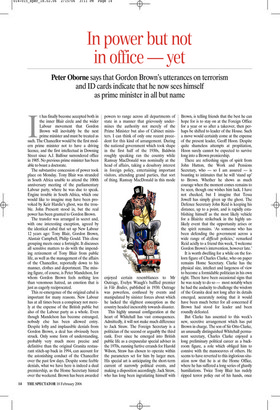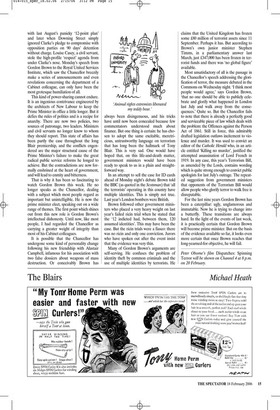In power but not in office — yet
Peter Oborne says that Gordon Brown’s utterances on terrorism and ID cards indicate that he now sees himself as prime minister in all but name It has finally become accepted both in the inner Blair circle and the wider Labour movement that Gordon Brown will inevitably be the next prime minister and must be treated as such. The Chancellor would be the first modern prime minister not to have a driving licence, and the first intellectual in Downing Street since A.J. Balfour surrendered office in 1905. No previous prime minister has been able to boast a doctorate.
The substantive concession of power took place on Monday. Tony Blair was stranded in South Africa unable to attend the 100th anniversary meeting of the parliamentary Labour party, where he was due to speak. Engine trouble in South Africa, which one would like to imagine may have been provoked by Keir Hardie’s ghost, was the trouble. John Prescott stood in, but the real power has been granted to Gordon Brown.
The transfer was arranged in secret and, with one interesting exception, agreed by the identical cabal that set up New Labour 12 years ago: Tony Blair, Gordon Brown, Alastair Campbell, Philip Gould. This close grouping meets once a fortnight. It discusses all sensitive matters to do with the impending retirement of Tony Blair from public life, as well as the management of the affairs of the Chancellor, reportedly down to his manner, clothes and deportment. The missing figure, of course, is Peter Mandelson, for whom Gordon Brown feels nothing less than venomous hatred, an emotion that is just as eagerly reciprocated.
This re-emergence of the original cabal is important for many reasons. New Labour has at all times been a conspiracy not merely at the expense of the British public but also of the Labour party as a whole. Even though Mandelson has become estranged, nobody else has been allowed entry. Despite lofty and implausible denials from Gordon Brown, a deal has obviously been struck. Only some form of understanding, probably very much more precise and definitive than the original Granita restaurant stitch-up back in 1994, can account for the astonishing conduct of the Chancellor over the past few days. Despite some feeble denials, what we have here is indeed a dual premiership, as the Home Secretary hinted over the weekend. Brown has been awarded powers to range across all departments of state in a manner that grievously undermines the authority not merely of the Prime Minister but also of Cabinet ministers. I can think of only one recent precedent for this kind of arrangement. During the national government which took shape in the first half of the 1930s, Baldwin roughly speaking ran the country while Ramsay MacDonald was nominally at the head of affairs, taking a desultory interest in foreign policy, entertaining important visitors, attending grand parties, that sort of thing. Ramsay MacDonald in this mode enjoyed certain resemblances to Mr Outrage, Evelyn Waugh’s baffled premier in Vile Bodies, published in 1930. Outrage was powerless, confused by events and manipulated by sinister forces about which he lacked the slightest conception as the country headed inexorably towards disaster.
This highly unusual configuration at the heart of Whitehall has vast consequences. Admittedly, it will not make much difference to Jack Straw. The Foreign Secretary is a politician of the second or arguably the third rank. Ever since he emerged into British public life as a crepuscular special adviser in the 1970s, running furtive errands for Harold Wilson, Straw has chosen to operate within the parameters set for him by larger men. His special art is anticipating the short-term current of narrowly political events, and making a disposition accordingly. Jack Straw, who has long been ingratiating himself with Brown, is telling friends that the best he can hope for is to stay on at the Foreign Office for a year or so after a takeover, then perhaps be shifted to leader of the House. Such a move would certainly come at the expense of the present leader, Geoff Hoon. Despite quite shameless attempts at propitiation, Hoon surely cannot be expected to survive long into a Brown premiership.
There are refreshing signs of spirit from John Hutton, the Work and Pensions Secretary, who — so I am assured — is boasting to intimates that he will ‘stand up’ to Brown. Whether he shows as much courage when the moment comes remains to be seen, though one wishes him luck. I have not checked, but I imagine that Tessa Jowell has simply given up the ghost. The Defence Secretary John Reid is keeping his distance, up to a point, and is rapidly establishing himself as the most likely vehicle for a Blairite strikeback in the highly unlikely event that the opportunity arises or the spirit remains. ‘As someone who has been defending the government across a wide range of difficult policies,’ remarked Reid acidly to a friend this week, ‘I welcome Gordon Brown’s intervention, however late.’ It is worth dwelling for a while on the forlorn figure of Charles Clarke, who on paper remains Home Secretary. Clarke has the physical size, intellect and largeness of view to become a formidable politician in his own right. There have been occasional signs that he was ready to do so — most notably when he had the audacity to challenge the wisdom of the Granita deal not long after its details emerged, accurately noting that it would have been much better for all concerned if Brown had stood for leader and been roundly defeated.
But Clarke has assented to this week’s new, secretive arrangement which has put Brown in charge. The son of Sir Otto Clarke, an unusually distinguished Whitehall permanent secretary, Charles Clarke enjoyed a long preliminary political career as a backroom figure, a role which obliged him to connive with the manoeuvres of others. He seems to have reverted to this inglorious situation now that he is at the Home Office, where he has suffered a long series of ghastly humiliations. Twice Tony Blair has rudely ripped terror policy out of his hands, once with last August’s panicky ‘12-point plan’ and later when Downing Street simply ignored Clarke’s pledge to compromise with opposition parties on 90 days’ detention without charge. Louise Casey, a civil servant, stole the high-profile ‘respect’ agenda from under Clarke’s nose. Monday’s speech from Gordon Brown to the Royal United Services Institute, which saw the Chancellor breezily make a series of announcements and even revelations concerning the department of a Cabinet colleague, can only have been the most grotesque humiliation of all.
This kind of power-sharing cannot endure. It is an ingenious contrivance engineered by the architects of New Labour to keep the Prime Minister in office a little longer. But it defies the rules of politics and is a recipe for anarchy. There are now two policies, two sources of patronage, two leaders. Ministers and civil servants no longer know to whom they should report. This state of affairs has been partly the case throughout the long Blair premiership, and the conflicts engendered are the major structural cause of the Prime Minister’s failure to make the great radical public service reforms he longed to achieve. But the contradictions are now formally enshrined at the heart of government, and will lead to enmity and bitterness.
That is why it has been so fascinating to watch Gordon Brown this week. He no longer speaks as the Chancellor, dealing with a subject which most people regard as important but unintelligible. He is now the prime minister elect, speaking out on a wide range of themes. The first point which shines out from this new role is Gordon Brown’s intellectual dishonesty. Until now, like most people, I had regarded the Chancellor as carrying a greater weight of integrity than most of his Cabinet colleagues.
It is possible that the Chancellor has undergone some kind of personality change following his new friendship with Alastair Campbell, infamous for his association with two false dossiers about weapons of mass destruction. Or conceivably Brown has always been disingenuous, and his tricks have until now been concealed because few commentators understood much about finance. But one thing is certain: he has chosen to adopt the same excitable, meretricious, untrustworthy language on terrorism that has long been the hallmark of Tony Blair. This is very sad. One would have hoped that, on this life-and-death matter, government ministers would have been ready to speak to us in a plain and straightforward way.
In an attempt to sell the case for ID cards ahead of Monday night’s debate Brown told the BBC (as quoted in the Scotsman) that ‘all the terrorists’ operating in this country have multiple identities. This is simply not true. Last year’s London bombers were British.
Brown followed other government ministers who placed a very heavy weight on last year’s failed ricin trial when he stated that the ‘12 indicted had, between them, 120 assumed identities’. This may have been the case. But the ricin trials were a fiasco: there was no ricin and only one conviction. Jurors who have spoken out after the event insist that the evidence was very thin.
Many of Gordon Brown’s arguments are self-serving. He confuses the problem of identity theft by common criminals and the use of multiple identities by terrorists. He claims that the United Kingdom has frozen some £80 million of terrorist assets since 11 September. Perhaps it has. But according to Brown’s own junior minister Stephen Timms, in a parliamentary answer last March, just £347,000 has been frozen in terrorist funds and there was ‘no global figure’ available.
Most unsatisfactory of all is the passage in the Chancellor’s speech addressing the glorification of terror, the measure debated in the Commons on Wednesday night. ‘I think most people would agree,’ says Gordon Brown, ‘that no one should be able to publicly celebrate and glorify what happened in London last July and walk away from the consequences.’ Quite so. But the Chancellor fails to note that there is already a perfectly good and serviceable piece of law which deals with the problem: the Offences against the Person Act of 1861. Still in force, this admirably drafted legislation outlaws incitement to violence and murder. It was used to convict an editor of the Catholic Herald who, in an article entitled ‘Killing no murder’, justified the attempted assassination of Lord French in 1919. In any case, this year’s Terrorism Bill, as amended by the Lords, contains wording which is quite strong enough to convict public apologists for last July’s outrage. The repeated suggestion from government ministers that opponents of the Terrorism Bill would allow people who glorify terror to walk free is disreputable.
For the last nine years Gordon Brown has been a caterpillar: ugly, unglamorous and immutable. Now he is trying to change into a butterfly. These transitions are always hard. In the light of the events of last week, it is practically certain that Gordon Brown will become prime minister. But on the basis of the evidence available so far, it looks even more certain that once Brown reaches that long-yearned-for objective, he will fail.



















































































 Previous page
Previous page